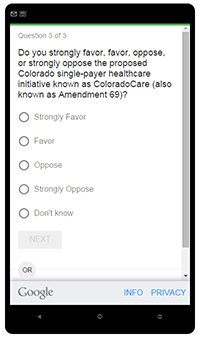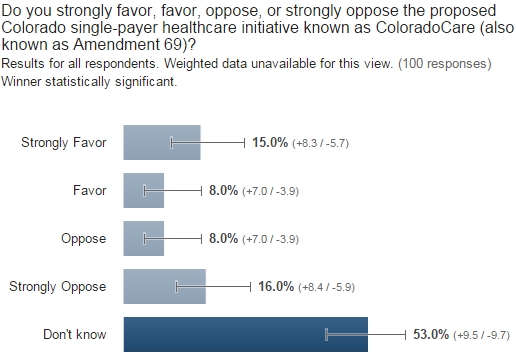Coloradans lack strong feelings about ColoradoCare
This November, Colorado residents will head to the polls and be faced with a question possibly more important than who should be the next president: should Colorado implement single-payer healthcare?
I was curious about how likely that proposal, known as ColoradoCare (or Amendment 69), was to pass. Unfortunately, no opinion polls exploring that question have been performed, so no data was available. I set out to fix that.
First, some background. ColoradoCare is a single-payer healthcare proposal for Colorado residents that will be funded by increased payroll taxes. Proponents of the program expect it to cost about $25 billion in its first year, which is roughly the same as the entire current Colorado state budget. The new 10% payroll tax will be split 33/67 between employees and employers. It will cover all healthcare services, which will be provided with no deductibles and no co-pays. The proposed constitutional amendment was added to the ballot after supporters gathered 156,000 signatures in 2015.
Opposition to ColoradoCare has formed as a bi-partisan coalition. Opponents argue that the plan is expensive, unworkable, and shouldn’t be enshrined in the constitution. They point to Vermont as a place that considered a similar system only to see those plans collapse.
But what do the people think?
I investigated hiring a polling firm like SurveyUSA to run a poll, but the cost would have been four to five digits. I searched awhile for cheaper options. Eventually, I decided to run a Google Consumer Survey.
Google Surveys are those slightly annoying short questionnaires that some sites use to unlock things like articles or premium features. They are not proper opinion polls by any stretch of the imagination. However, there’s some evidence that those surveys can be reasonably accurate for predicting political outcomes. The sample population is reasonably random, and Google knows enough about individual internet users (gender, age, income) to allow some level of weighting.
For my survey, I decided to use a series of three questions. The first two would be screening questions to try to limit responses to likely Colorado voters:
- Are you residing/working in Colorado? (Yes/No/Prefer not to say)
- Are you likely to vote in the 2016 general election this November? (Yes/No/Prefer not to say)
The presentation order of the answers was randomized for each person. I wanted to ask “Are you a Colorado resident?” but that question got rejected by Google as being too personal; hence, the slightly strange “residing/working” phrasing of the first question.
If the user answered “yes” to each of the screening questions, they were presented with the real question:
- Do you strongly favor, favor, oppose, or strongly oppose the proposed Colorado single-payer healthcare initiative known as ColoradoCare (also known as Amendment 69)? (Strongly Favor/Favor/Oppose/Strongly Oppose/Don’t know)
For this question, the order of the answers was randomly reversed.
Google ran some tests, came back with a quote (per completed questionnaire), and asked me how much I wanted to spend. The per-response cost was about an order of magnitude lower than a proper poll, but still a bit expensive, so I went with 100 responses. For voter turnout of 2.6 million (roughly true of Colorado), 100 responses provides +/- 10% confidence intervals at a 95% confidence level — enough to get a feel for things.
I ran the poll starting yesterday and going into today (March 2 – March 3, 2016). This morning, Google emailed me to tell me that the results were ready. I clicked the link with bated breath.
Here’s the summary of the results. About half of the population doesn’t have an opinion about the proposal or is unfamiliar with it. Among the half that has an opinion, there is a fairly even split between those in favor and those opposed.
Interestingly, the error bars came in right about as expected, roughly +/- 10%. Here’s what the results looked like if you grouped the favor/strongly favor and oppose/strongly oppose options. Also, feel free to look at the raw data, which includes demographic information of the survey respondents.
Now, there are a huge number of issues with this survey: small sample size; bias towards people who use the internet; under-representation of the poor, wealthy, and elderly; and so on. Still, I think a couple of conclusions are reasonable:
- A sizable portion of the population is available to be swayed for or against the amendment
- The margin of passage or rejection at the polls is not likely to be as large as some commentators had hoped or feared.
Should be interesting to see how these results compare with the first proper polls on the subject, which I expect will happen sometime this summer.
UPDATE June 7, 2016: The political futures market PredictIt.org now offers futures contracts for the ColoradoCare question. For those unfamiliar with the concept of a political futures market, it’s a way for people to bet money on whether or not ballot measures will pass, which people will get elected, and so on. The idea is that the “wisdom of crowds” can provide insight into the likelihood of future events. The market for the ColoradoCare question is new as of today, so it’s too soon to gain any insight from it. Still, in the absence of better polls, this market might be the best gauge of whether Amendment 69 will pass.


Recent Comments